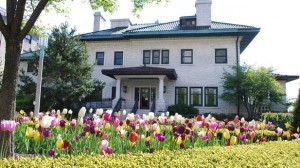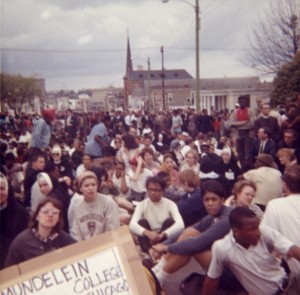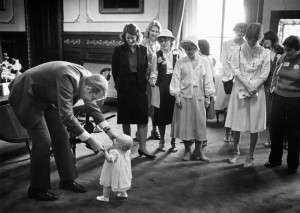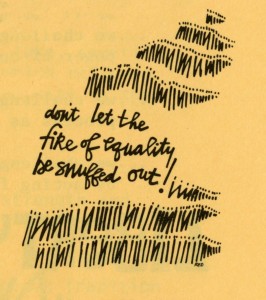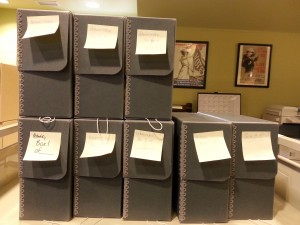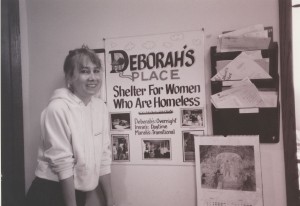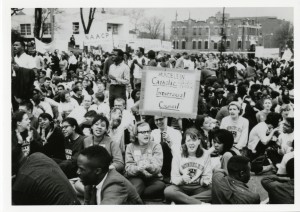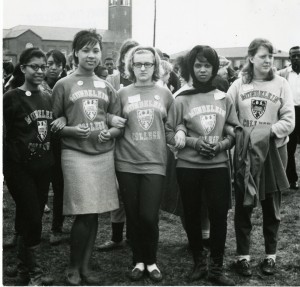For the majority of my time at Loyola University, Piper Hall was a subject of mysterious beauty. It is unlike any of the other buildings on campus. The beautiful stone mansion sits overlooking Lake Michigan and during the warmer months it is surrounded by numerous flowers and greenery. Even before I set foot inside its elegantly furnished parlor, I was cognizant of a deep historical aura surrounding the building. Now, during my last semester at Loyola, I am able to explore not only the building but its history and the connections to the past it houses. On the very top floor of Piper Hall sits the Women and Leadership Archives, a warm place for researchers to delve into the past of Mundelein College and explore the lives of important women in Chicago. It is here that I have chosen to do my history internship.
I first began working on developing online resources for History Fair students; however, after comparing many archives’ materials I found that the Women and Leadership Archives was already ahead of the curve. I then discovered from talking with Nancy Freeman, the Director of the archives, that the WLA had a special story to tell in light of the 50th anniversary of the march from Selma, Alabama. As an historian, I love researching and sharing stories that need to be heard. So I dived in with the intent of creating a comprehensive exhibit to honor the 28 Mundelein delegates who participated in the Selma March.
I used Mundelein’s Skyscraper Newspaper as my first resource in understanding the context, motivation, and story of the Mundelein delegation. From the newspapers I discovered contrasting viewpoints, personal narratives of college life in the 1960s, journals of those who went to Selma, and important facts about the journey. As a female college student sitting in the same classrooms as the Mundelein college students back in the 1960s, I cannot help myself from comparing my experience from those told in the newspaper. Theirs was a time of passion and expression; mine a time of quiet contemplation and self-discovery.
The next step in my research will be interviewing one or two women who participated in the Selma March. This is an exciting step, for it will give my research new life and meaning. These women’s experiences are important to preserve and can be used to better understand women at Mundelein in the 1960s. It will also give us insight into the experiences of female college students in Chicago and perspective into the roots of prominent women today. Oral history is foreign to me but I am excited, albeit a bit nervous, to better understand the role of the interviewer and to add important stories to the collection at the WLA.
I look forward to continue being inspired by the beauty that is Piper Hall, and through the resources it houses, to better understanding life at Mundelein in the 1960s. As a culmination of my time at the Women and Leadership Archives, I hope to produce an online blog exhibit that accurately imparts to the reader the tumultuous and expressive feeling of the 1960s, while telling the story of a group of Mundelein students who so vehemently wanted to march for racial equality.
Elyse is an undergraduate intern at the WLA and is studying History, International Studies, and French at Loyola University. In her free time she knits colorful socks, eats as much interesting food as Chicago has to offer and dreams of camping in the middle of nowhere, Minnesota.
Loyola University Chicago’s Women and Leadership Archives Blog is designed to provide a positive environment for the Loyola community to discuss important issues and ideas. Differences of opinion are encouraged. We invite comments in response to posts and ask that you write in a civil and respectful manner. All comments will be screened for tone and content and must include the first and last name of the author and a valid email address. The appearance of comments on the blog does not imply the University’s endorsement or acceptance of views expressed.

